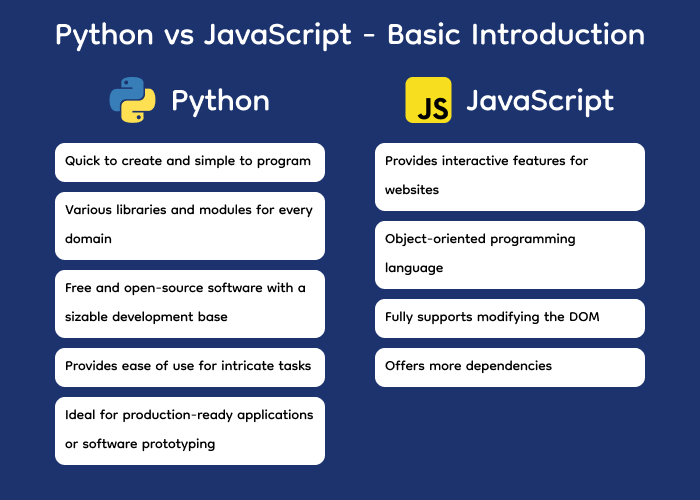Python vs JavaScript – Basic Introduction

Python originally gained popularity in 1991 for writing code that could address any measurable and explicable issues. It has experienced a surge in popularity in the academic setting, processing data, AI/ML, etc., due to software stacks like Django.
Features of Python:
- Quick to create and simple to program
- Various libraries and modules for every domain
- Free and open-source software with a sizable development base
- Provides ease of use for intricate tasks.
- Ideal for production-ready applications or software prototyping
JavaScript is a 1995 technology that aims to transform the web into a more interactive, genuine app platform. Although JavaScript was first restricted due to low internet speed, ineffective marketing, bad design decisions, and incompatibility with other browsers, these problems were later resolved by contemporary JavaScript frameworks like jQuery, React, AngularJS, etc.
Features of JavaScript:
- Provides interactive features for websites.
- Object-oriented programming language
- Fully supports modifying the DOM
- Offers more dependencies
Python vs JavaScript – Performance
- Python’s performance: Python is a popular choice for coding, data analysis, and web development because of its well-known simplicity and ease of use. However, because Python is an interpreted language rather than a compiled language like C or C++, it is often slower. CPU-intensive processes may take longer to execute as a result. Using built-in functions, and libraries like NumPy for numerical computations, and writing crucial parts in C or Cython for speed-critical code are just a few optimization strategies that may be used to increase Python’s efficiency.
- JavaScript’s performance: Just-in-time compilation is one of the advanced optimization strategies employed by modern JavaScript engines, such as V8 and SpiderMonkey, which may greatly increase speed. Because JavaScript is event-driven and asynchronous, it excels at effectively managing I/O-bound tasks like file operations and network requests. However, JavaScript, like Python, might have performance problems while handling computationally demanding jobs.
Python vs JavaScript – Learning Curve & Libraries
- Python: Python offers an extensive collection of libraries and frameworks that are suited for many fields, such as NumPy, SciPy, Django, Flask, pandas, and TensorFlow, sci-kit-learn. Because of its robust ecosystem, Python is widely used in data science and other related subjects. Tools like pandas and Matplotlib make complicated data processing and visualization jobs easier to do.
- Javascript: JavaScript developers may use a wide range of tools and services to make their development process more efficient. With new libraries and frameworks appearing to meet contemporary development difficulties like serverless computing and progressive web apps, the JavaScript ecosystem is still fast evolving.
Python vs JavaScript – Scalability
In Python vs JavaScript, JavaScript is more scalable than Python. Scalability is provided by Python web frameworks such as Django and Flask, which provide capabilities like load balancing, caching, and asynchronous request processing.
Furthermore, scalability in high-traffic online applications may be impacted by Python’s synchronous nature, which may lead to less effective handling of concurrent requests when compared to asynchronous languages like Node.js.
Python vs JavaScript – Digital app development
In Python vs JavaScript, both are widely used for online and mobile development, their applications and strengths vary depending on the topic.
- Web Development: Python offers powerful web frameworks like Django and Flask. Python’s synchronous nature may have an impact on performance in high-traffic situations when compared to asynchronous languages like JavaScript, even if it is a good choice for developing scalable online applications. JavaScript dominates web development with frameworks like React.js, Angular, and Vue.js for front-end development, and Node.js for server-side development. These frameworks offer efficient tools and libraries for building interactive and scalable web applications.
- Mobile app development: Python can be used for mobile development through frameworks like Kivy and BeeWare. JavaScript is widely used for mobile app development through frameworks like React Native. The popularity and efficacy of frameworks like React Native for mobile development are partly due to JavaScript’s enormous community and ecosystem, as well as its comprehensive documentation and community support.
Conclusion
Choosing between Python vs JavaScript depends on various factors. This includes project requirements, developer expertise, and scalability needs. Python is a popular choice for domains like data science, AI/ML, and web development because of its superior simplicity, adaptability, and ease of use.
However, JavaScript’s asynchronous nature and widespread use in web development make it an excellent choice for creating scalable and dynamic online applications. Making an informed choice ultimately requires knowing the unique characteristics and applications of each language.
FAQs
Is JavaScript faster than Python?
Is Nodejs a language?
Is Python easier than JavaScript?
Which is better to learn, Python or JavaScript?
Can you learn Python without knowing HTML?
Ravi Bhojani is the Chief Marketing Officer (CMO) at Alian Software, where he spearheads the company’s marketing strategies and drives its brand presence in the competitive IT services landscape. With over a decade of experience in the technology and marketing sectors, Ravi has consistently demonstrated his ability to blend innovative marketing techniques with deep industry knowledge to deliver outstanding results.